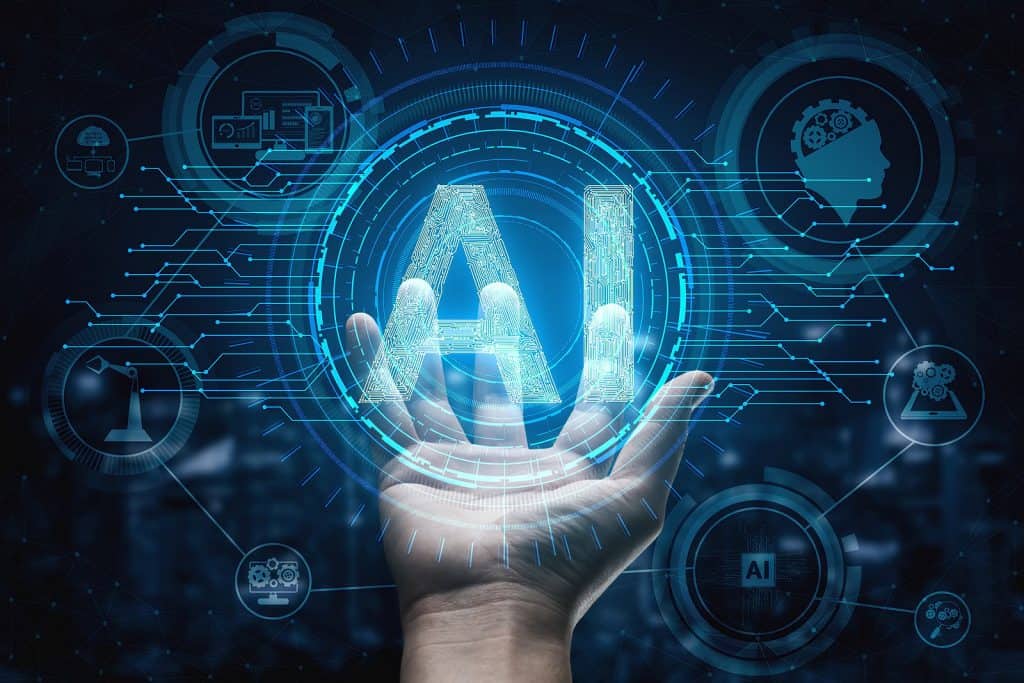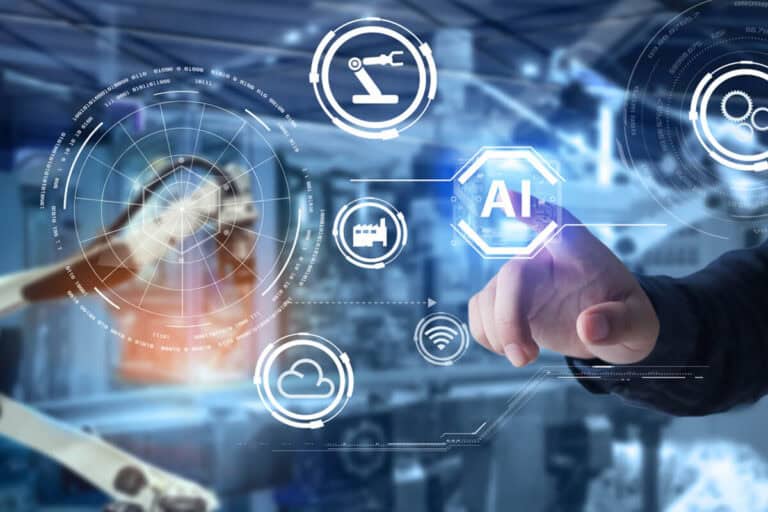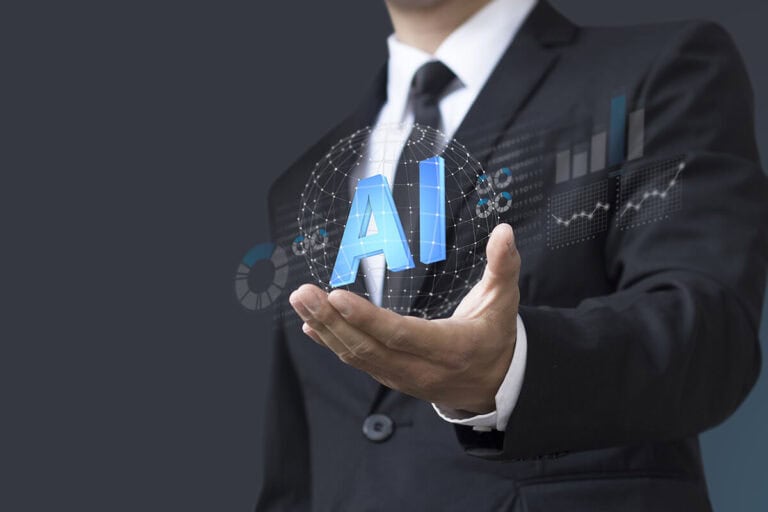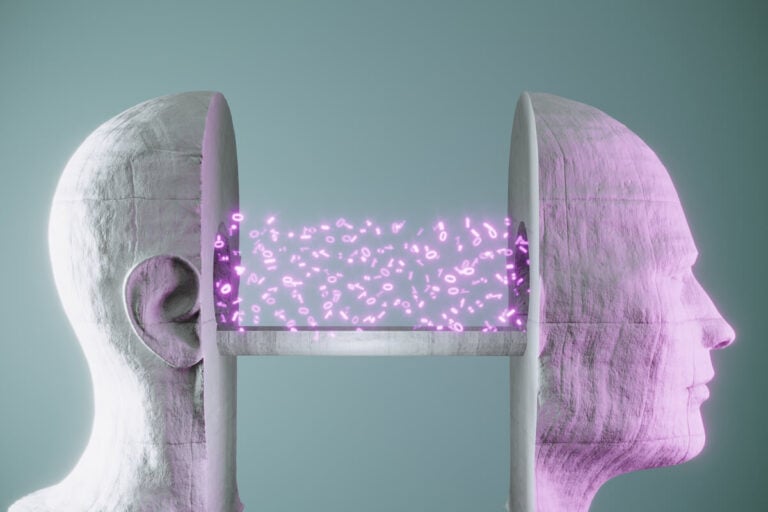Artificial intelligence (AI) is increasingly driving progress in technology and business. It is widely used in various industries, and the effects of AI can be found in almost every aspect of creativity. The development of AI is facilitated by large amounts of data and increased available computing power.
Table of Contents
ToggleAccording to statistics, in the United States, small businesses create more than half of jobs and account for more than 40 percent of GDP.
Annualized growth of real GDP in the United States from 2011 to 2021 (source: Statista)
Therefore, as artificial intelligence becomes more popular, developers create new solutions for companies. This technology is in trend, and there are a few ways to use AI for business. In this article, we’ll look at how AI is changing industry.
Benefits of Artificial Intelligence for Business
The impact of AI on your business is huge as it helps to solve a great variety of tasks:
- automate and optimize routine processes to save time and money
- increase operational efficiencies
- use cognitive technologies to make business decisions
- avoid ‘human error’
- predict customer preferences and grow your customer base
- generate quality leads
- increase revenue
- offer intelligent advice and support
Use AI to Collect and Analyze Data
Qualtrics conducted a study in which 250 marketing leaders took part. It found that 96% expect AI to handle regular research tasks, such as data cleansing, within five years. Furthermore, 63% believe that soon AI will replace statistical analysis.
Professor Richard Susskind, the author of “Online Courts and the Future of Justice” and technology adviser to the Lord Chief Justice of England and Wales, emphasized that opportunities and how AI affects business are limitless.
Use AI to Hire Employees
Let’s look at the impact of artificial intelligence on business in this sphere and how it helps personnel officers.
AI can help with recruiting by analyzing data from different sources to recognize the candidates with optimal qualities. It can analyze employees’ feedback to determine their level of job satisfaction and even identify employees who are most likely to leave the company.
In its Future of Jobs Report 2018, the World Economic Forum predicts that 75 million jobs could be lost and 133 million new jobs created to adapt to the new division of labor between humans, machines, and algorithms.
In 2013 Carl Frey, author of The Technology Trap and director of the Future of Work program at Oxford Martin School, estimated that 47% of US jobs were at risk of automation. UK categorizations, in its turn, gave a figure of 35%.
Make Your Backend Organization More Efficient with AI
AI’s impact on business and potential to replace humans is often a hot-button topic. But in most cases, AI is evaluated as a technology that only takes over some tasks, primarily related to the backend — for example, basic logistics operations such as accounting, planning, etc. Therefore, artificial intelligence is used to help make human resources work better.
In an article for Minutehack, inniAccounts co-founder James Poyser describes the work of his business industry with AI. The use of AI for backend tasks reduced pressure on employees.
Use AI to Improve Service
Modern companies have many ways to interact with customers. It’s time to develop new methods to quickly solve customer problems with the rapid development of online communication channels. Gartner predicts that a quarter of customer service operations will use a custom virtual assistant (VCA) or chatbot by 2020.
According to a Qualtrics survey, a digital assistant will conduct part of the surveys, implemented within five years. Therefore, forecasts give strong reasons to expect that the effect of AI in the global business sphere in customer communications will be significant in the coming years.
24/7 customer service lines are expensive for small businesses. And chatbots, in this case, are a good solution for emerging markets. Customers have access to virtual assistants at any time, and they immediately work on giving answers to the questions from potential users.
For example, Huawei uses AI to fight illegal logging and poaching.
Build an AI-powered Marketing Platform
A study found that 93% of marketers see artificial intelligence as one of the best opportunities for marketing development. AI is fundamentally changing technologies in the market for both small businesses and corporations.
Placing ads online opens the opportunity for small businesses to reach a broader audience. And its current and future impact is changing society. Companies can use Facebook and Google advertising platforms to find specific consumers, collect and analyze consumer data, etc., without the need for an army of marketers.
In an April 2018 McKinsey report, it was said that AI has the most significant impact on marketing and sales. Therefore, the implementation of AI will attract as many consumers as possible in the future.
Industry Use Cases of Artificial Intelligence
AI technologies are most actively used in America, Japan, China, and Germany. For example, Harley-Davidson, a well-known motorcycle company, has reduced the assembly time from 21 days to 6 hours using intelligent systems. In addition, tech giant Samsung report says it plans to ultimately convert one of its factories to AI-powered production in 2023.
Public Sector and Artificial Intelligence
AI systems using cameras and motion sensors can keep order on the city streets and in crowded places. It can also predict the occurrence of dangerous situations, identify criminals, accurately verify documents, and prevent theft.
Medicine and Health Under the Control of AI
Thanks to analyzing and systematizing data, innovative programs and machines have become effective assistants to modern doctors. Of course, the final diagnosis remains with the person, but the impact of AI on business is broad, as it helps collect and process data quickly. Based on them, doctors can make a faster and more accurate diagnosis.
WHO issued its first global report on Artificial Intelligence (AI) in health and six guiding principles for its design and use. According to the research, AI systems should be carefully designed to reflect healthcare settings.
Matteo Lambrughi, in his research “The Impact of Artificial Intelligence in Medicine on the Future Role of the Physician”, highlighted great perspectives of AI in this sphere.
Smart House
The most popular product created using AI technology, according to the forecast, is the smart house. It is not surprising because the concept of its application is close to everyone: a smart home makes life more comfortable and orderly. The system can monitor the home’s safety, the consumption of water and light, the climate, control the wiring condition, and automatically do the cleaning.
Insurance
Compared to related industries that have successfully moved towards digital transformation, insurance services have often failed to meet the modern tastes of customers. Still, insurers have rushed to apply artificial intelligence technology to prevent the situation from worsening, which has led to a significant change in the insurance industry.
Looking ahead, researchers at Juniper expect total AI-powered insurance premiums to reach $20.6 billion in 2024, up from $1.3 billion in 2019. In addition, AI in insurance’s continuous development will improve or even automate most processes.
Artificial Intelligence performing any task human task is still far away. However, it would be nice if AI did all the analytical work: collecting and importing data and highlighting trends. Leaders in the insurance industry can attest that there are already many opportunities for AI use. Today, artificial intelligence in the insurance industry measures customer engagement, insurance risk coverage, premium payout flows, and claims submission.
Impact of AI on Business Conclusion
It’s a fact that AI will affect your business in the future. The potential impact on how your company operates is significant, while the negative impact is not evident. It demands an open-minded attitude and willingness to embrace new opportunities.
Artificial intelligence is radically changing many industries in the business world. With its ability to identify patterns and detect anomalies in vast amounts of digital information in business processes, AI opens up completely new possibilities. Once trained, it can handle many everyday tasks with ease.
The introduction of AI allows employees to focus on solving more complex technical problems or improving the quality of customer service instead of performing routine tasks of a low level of complexity.





